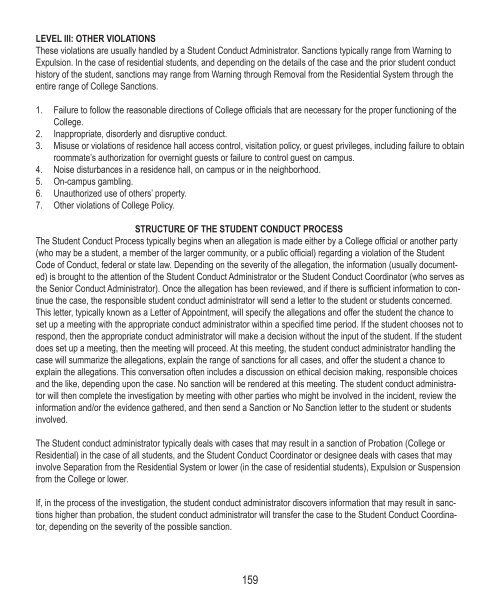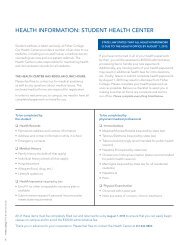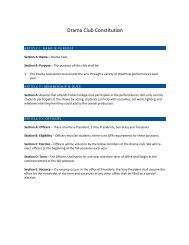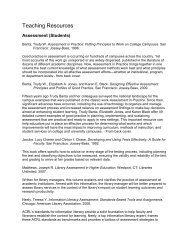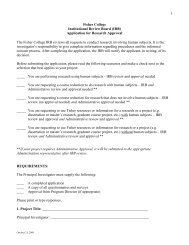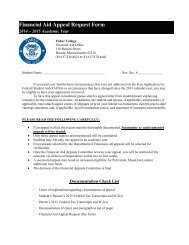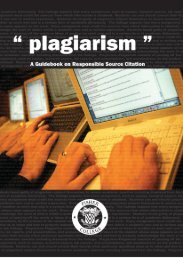A MESSAGE FROM THE DEAN OF STUDENTS - Fisher College
A MESSAGE FROM THE DEAN OF STUDENTS - Fisher College
A MESSAGE FROM THE DEAN OF STUDENTS - Fisher College
- No tags were found...
You also want an ePaper? Increase the reach of your titles
YUMPU automatically turns print PDFs into web optimized ePapers that Google loves.
LEVEL III: O<strong>THE</strong>R VIOLATIONS<br />
These violations are usually handled by a Student Conduct Administrator. Sanctions typically range from Warning to<br />
Expulsion. In the case of residential students, and depending on the details of the case and the prior student conduct<br />
history of the student, sanctions may range from Warning through Removal from the Residential System through the<br />
entire range of <strong>College</strong> Sanctions.<br />
1. Failure to follow the reasonable directions of <strong>College</strong> officials that are necessary for the proper functioning of the<br />
<strong>College</strong>.<br />
2. Inappropriate, disorderly and disruptive conduct.<br />
3. Misuse or violations of residence hall access control, visitation policy, or guest privileges, including failure to obtain<br />
roommate’s authorization for overnight guests or failure to control guest on campus.<br />
4. Noise disturbances in a residence hall, on campus or in the neighborhood.<br />
5. On-campus gambling.<br />
6. Unauthorized use of others’ property.<br />
7. Other violations of <strong>College</strong> Policy.<br />
STRUCTURE <strong>OF</strong> <strong>THE</strong> STUDENT CONDUCT PROCESS<br />
The Student Conduct Process typically begins when an allegation is made either by a <strong>College</strong> official or another party<br />
(who may be a student, a member of the larger community, or a public official) regarding a violation of the Student<br />
Code of Conduct, federal or state law. Depending on the severity of the allegation, the information (usually documented)<br />
is brought to the attention of the Student Conduct Administrator or the Student Conduct Coordinator (who serves as<br />
the Senior Conduct Administrator). Once the allegation has been reviewed, and if there is sufficient information to continue<br />
the case, the responsible student conduct administrator will send a letter to the student or students concerned.<br />
This letter, typically known as a Letter of Appointment, will specify the allegations and offer the student the chance to<br />
set up a meeting with the appropriate conduct administrator within a specified time period. If the student chooses not to<br />
respond, then the appropriate conduct administrator will make a decision without the input of the student. If the student<br />
does set up a meeting, then the meeting will proceed. At this meeting, the student conduct administrator handling the<br />
case will summarize the allegations, explain the range of sanctions for all cases, and offer the student a chance to<br />
explain the allegations. This conversation often includes a discussion on ethical decision making, responsible choices<br />
and the like, depending upon the case. No sanction will be rendered at this meeting. The student conduct administrator<br />
will then complete the investigation by meeting with other parties who might be involved in the incident, review the<br />
information and/or the evidence gathered, and then send a Sanction or No Sanction letter to the student or students<br />
involved.<br />
The Student conduct administrator typically deals with cases that may result in a sanction of Probation (<strong>College</strong> or<br />
Residential) in the case of all students, and the Student Conduct Coordinator or designee deals with cases that may<br />
involve Separation from the Residential System or lower (in the case of residential students), Expulsion or Suspension<br />
from the <strong>College</strong> or lower.<br />
If, in the process of the investigation, the student conduct administrator discovers information that may result in sanctions<br />
higher than probation, the student conduct administrator will transfer the case to the Student Conduct Coordinator,<br />
depending on the severity of the possible sanction.<br />
159


